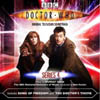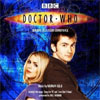The Stolen Earth
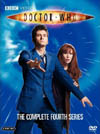 |
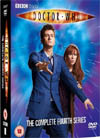 |
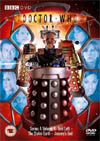 |
DVD NTSC
Region 1
14-episode
box set




|
DVD PAL
Region 2
14-episode
box set


|
DVD PAL
Region 2
3-episode volume


|
|
(Doctor Who Story No. 203, starring David Tennant)
- written by Russell T. Davies
- directed by Graeme Harper
- produced by Phil Collinson
- music by Murray Gold
- 2 episodes:
- The Stolen Earth (46 min.)
- Journey's End (63 min!)
|
Story: The Earth has vanished from its proper orbit,
as have 24 other planets across the universe,
and the Doctor and Donna consult with space authorities
to try to find out where they went and why. Meanwhile,
the Doctor's allies on Earth band together to fend off
an attack by some of his oldest and deadliest enemies....
What is Project Indigo and the Osterhagen Key that
Martha Jones is put in charge of by UNIT? What secrets
of the future does the abomination in the heart of the
enemy lair continue to conceal? And what dark truths
from the Doctor's own soul will be revealed as all things
come to the end?
|
|
DVD Extras (box sets only) include:
- Episode One audio commentary by
David Tennant (The Doctor),
writer Russell T. Davies, and
executive producer Julie Gardner.
- Episode Two audio commentary by
Tennant, Davies, and
Catherine Tate (Donna Noble).
- Doctor Who Confidential featurette: Friends and Foe (13 min.) with
Tennant, Davies,
Billie Piper (Rose),
Nicholas Briggs (Dalek Voices),
all four Dalek Operators,
director Graeme Harper, and
producer Phil Collinson.
- Doctor Who Confidential featurette: End of an Era (24 min.) with
Tennant, Tate, Davies, Harper, and others...
- David Tennant's Video Diaries (16 min.) with
Tennant, Tate, Piper, Briggs, Harper,
Elisabeth Sladen (Sarah Jane Smith),
John Barrowman (Captain Jack Harkness),
Freema Agyeman (Martha),
Noel Clarke (Mickey Smith), and
Camille Coduri (Jackie Tyler).
- "The Journey (So Far)" special retrospective featurette (31 min.)
- Deleted Scenes with alternate ending (3 min.) - introduced by Davies
- Trailers & Promos
Buyers' Guide Review
by Martin Izsak
|
|
(A more in-depth analysis, containing "SPOILERS" and intended
for those who have already seen the program, can be accessed
here.)
|
The style of writer Russell T. Davies' Doctor Who season finales
has been well-established over the previous three years, and this one
does not fail to follow suit, while escalating in ambition and in the
number of threads drawn into the mix. The elements in this patchwork
quilt range mostly between decent and excellent, producing a far
higher quality product than either
"Bad Wolf" (the season 27 finale) or
"The Sound of Drums" (the season 29 finale).
Although the jury may continue to debate whether or not this story is truly
better than
"Doomsday" (the season 28 finale)
for some time to come, I think it's safe to say that both the stakes
and the excitement level are higher in this story. Oh yes.
Welcome to the second BIG winner in the Doctor Who Season 30 box set.
I must confess that the opening moments had me worried about all the
old mistakes haunting us yet again, starting off with the TARDIS ploncked
on the overused England Earth location, with the camera rolling just a
second too late to catch a good materialization effect, suggesting
textbook cheapness. But, Earth is where one logically finds the most
semi-regular and spinoff characters which Davies wants to incorporate
into this big finale, and we spend significant time on other planets
and in other areas of space previously only described (countless times)
in dialogue, AND the TARDIS certainly makes up for many of its earlier
missed opportunities this season by delivering a lot of satisfying movement
effects. Not sure how the Earth can get nabbed without the TARDIS getting
nabbed along with it, but whatever.... the sequence still looks good.
In the end we really can't complain much today. Our fourth alien planet
story in a row, sixth within the season. It came late, but the production
team finally got their settings balanced correctly. Hooray.
This story's plot has only one real reason for existence: to facilitate
the largest Doctor Who character reunion party since
"The Five Doctors" (story no. 130)
while still disguising it as an adventure. One can then go down the list
of guests and story elements to figure out which were good ideas
and which weren't.
Bringing back Sarah Jane Smith has to be one of the best moves,
as Elisabeth Sladen manages to do the character better justice here
with her limited screen time than she managed back in
"The Five Doctors". Partly it's because she's in a good new place in her
life, helped no doubt by having further developed on her own spinoff
for a full season instead of being brought in under Jon Pertwee's Doctor's
wings. Through her, K9 gets a brief and welcome cameo, while new characters
like Luke and the computer "Mr. Smith"
are completely
extraneous bafflements to those who aren't invested in her spinoff show.
Now to the other spinoff, which ropes in the Torchwood gang.
Their leader Captain Jack Harkness is a welcome addition to the story,
being a proper Doctor Who character. Actor John Barrowman is now
comfortably settled into his role, continuing the good vein he was in
at the end of season 29 and being miles better than his initial appearances
in season 27.
As for the rest of the Torchwood gang,
one doesn't get enough of any of them to really get a sense of
who they are or what they're about... and I have to say that taking precious
screen time to show one of them phoning some unknown off-screen friend or
family member is a real waste of.... precious screen time.
Martha Jones is also back, which is a decent decision. While the
character is enjoyable in her own right, she also gets some of the
most intriguing plot action all to herself. Bringing back UNIT with
her seems logical.... but the shortage of recurring UNIT faces makes the
exercise not really worth putting on screen.
Martha even comes complete with her mother.... and yawn....
and Davies has gone too far again.
Donna's family members are still the current domestic semi-regulars,
so they too are in this one, more for colour and perspective than
anything else during the story proper. But of course, we'll take more
of Bernard Cribbins' Wilfred Mott any day, and he continues to put a
special charm into all his scenes here, whether important or not.
Good show.
I'm going to stop my discussion of the roster here to prevent any
unnecessary spoilers. If, however, you've already seen the story,
you should be reading the
in-depth analysis version of this review anyway,
where I cut loose into everything....
One of the
big problems with cramming such a large cast into a single story,
and trying to give each of them their own moment and significant thing
to do, is that the Doctor suffers with not enough to do.
He and Donna do get a good section of
story to deal with
in outer space, with cool aliens in their own realms of influence,
getting the perspective of the
galactic community at large (finally!), and working through a good
sci-fi mystery.
THIS is what the show has been so
begging for for so long.
There is a dead
give-away / homage / nod to the Douglas Adams story
"The Pirate Planet" (story no. 99)
from which this tale's sci-fi premise was partially pinched.
I loved "The Pirate Planet". It's worth pinching from.
And before long,
we find ourselves building to one of the most mindboggling
cliffhangers in the show's history, and certainly the best one for
season 30.
Oh yes.
"We will discover it together...."
Once more in typical Davies fashion, the plot is less about engaging
action stratagems between the Doctor and his antagonists, which ideally
should occupy a few central story beats at some point, and more about
discovering ideas, which is another most important aspect of sci-fi.
Sadly, the cast seem to love to ramble through most of the sci-fi dialogue
at a pace too quick for average audience members to grasp. I think in this
particular story it really does show that the explanations are just
convenient excuses for Davies to be able to shape the character
interactions in ways he feels are ideal for the script. Most of the
truly outstanding ideas have come from previous stories anyway.
There is much to discuss surrounding those ideas, and their relation
to plot, but watch the story first,
get your own feel for it, then come back to read the
in-depth analysis review for a perspective
you might have missed.
|
Musically, the gamut is packed into this adventure until it becomes
something of a Murray Gold's best Doctor Who hits collection, with pieces
pulled from all of the last four years, plus of course a few brand new
compositions for this particular story thrown into the mix as well.
"A Pressing Need to Save the World" has been heard in snippets and alternate
arrangements throughout season 30, but this story probably gives us the
biggest and longest intact helpings of it. Cool.
Of course track 26, "Song of Freedom", is a shoe-in for becoming
a fan favourite.
Murray tends to write at least one completely
tasteless track each year as well - this year's stinker is called
"Hanging on the Tablaphone", which sounds like the epileptic fit caused
when a junkie struggles hard to get their frantic fix of cell-phone use
and ends up giving a music synthesizer diarrhoea, all while thinking
that it's macho. This one definitely should have been left off of the CD
in favour of some of the Sontaran musical gimmicks.
Graeme Harper does brilliant work directing the whole show,
bringing the right level of excitement and emotion to nearly every scene.
Very well done,
and honestly, it's hard not to be satisfied with the results here.
It is well worth noting that, while complying with the BBC's
insistence to make the end credits 25 seconds shorter, and thus whip by
so fast that they become almost unreadable, the production team at the same
time produces a 63-minute episode for a 45-minute time slot. I don't know
how much of this episode the British audience saw, but the Canadian CBC
chopped off a good 20 minutes of it for its broadcast. Not that that
mattered too much since the Region 1 DVD box set was released several weeks
earlier. I only tuned back in to see what they would chop.
If you've only seen this one on TV, you may want to buy the
DVD to see the rest of it. You have missed some good things!
|
Music by Murray Gold
"Song of Freedom",
"The Dark and Endless Dalek Night",
"A Pressing Need to Save the World",
"Hanging on the Tablaphone",
"The Doctor's Theme Series Four",
"Corridors and Fire Escapes",
"The Greatest Story Never Told",
"Turn Left", "Midnight",
"Life Among the Distant Stars", and
"The Rueful Fate of Donna Noble"
are available on:
|
"All the Strange, Strange Creatures",
"The Dream of a Normal Death", and
alternate versions of "Donna's Theme" and
"Evolution of the Daleks"
are available on:
|
"Seeking the Doctor",
"Harriet Jones, Prime Minister",
"Rose in Peril", "The Daleks",
"Hologram", "Rose's Theme",
"The Impossible Planet",
and alternate versions of "Doomsday" and
"Song for Ten"
are available on:
|
|
Some of the wrap-ups
absolutely deserve the lengthy screen time they get,
while others actually worked better in the CBC's truncated version.
Whatever your opinion of the design of these from the writing perspective,
all are very well executed and very moving.
Bernard Cribbins in particular does some of his best work of the story
in his final moments on screen.
What a lovely character....
And there you have it. Another season of Doctor Who comes to a close
with a climactic epic blockbuster of a story. And if I had to decide right
now, I think this one manages to inch ahead of
"Doomsday" (the season 28 finale).
Time will tell if that judgment holds.
I do think that
"Silence in the Library" (story no. 200),
"The Impossible Planet" (story no. 178), and
"Rise of the Cybermen" (story no. 176)
are better, more focused stories. But that really doesn't take away from
the achievement here. "The Stolen Earth" is excellent, enjoyable
entertainment. I dare you to try to watch this
one without feeling the excitement.
Season 30 Rankings:
Best Story:
- Silence in the Library
- The Stolen Earth
- The Doctor's Daughter
- Voyage of the Damned
- Turn Left
- The Sontaran Stratagem
- The Fires of Pompeii
- Planet of the Ood
- Midnight
- The Unicorn and the Wasp
- Partners in Crime
(The Fires of Pompeii has been reassessed,
and now beats Planet of the Ood)
Best Music Composition (all Murray Gold):
- Silence in the Library
- Voyage of the Damned
- Turn Left
- Planet of the Ood
- Partners in Crime
- The Doctor's Daughter
- Midnight
- The Stolen Earth
- The Fires of Pompeii
- The Sontaran Stratagem
- The Unicorn and the Wasp
|
|
Best Writer:
- Steven Moffat (Silence in the Library)
- Russell T. Davies (The Stolen Earth, Voyage of the Damned, Turn Left, Midnight, Partners in Crime)
- Stephen Greenhorn (The Doctor's Daughter)
- Keith Temple (Planet of the Ood)
- Helen Raynor (The Sontaran Stratagem)
- James Moran (The Fires of Pompeii)
- Gareth Roberts (The Unicorn and the Wasp)
(Why did we still not get more from writers
Matt Jones, Tom MacRae, and Toby Whithouse
who aced season 28's rankings?
Or Chris Chibnall who was awesome in Season 29?
I'd have preferred another Tom MacRae story to Midnight in particular.)
Best Director:
- Graeme Harper (The Stolen Earth, Turn Left, Planet of the Ood, The Unicorn and the Wasp)
- James Strong (Voyage of the Damned, Partners in Crime)
- Colin Teague (The Fires of Pompeii)
- Euros Lyn (Silence in the Library)
- Alice Troughton (Midnight, The Doctor's Daughter)
- Douglas MacKinnon (The Sontaran Stratagem)
|
"The Stolen Earth" has become available on DVD.
Click on the Amazon symbol for the location nearest you
for pricing and availability:
 |
 |
 |
DVD NTSC Region 1
14-episode boxed set
for the North American market:
 in the U.S.
in the U.S.

 in Canada
in Canada

|
DVD PAL Region 2
14-episode boxed set
for the U.K.


|
DVD PAL Region 2
3-episode volume
U.K. format only


|
Note: The full season sets
contain commentaries, behind-the-scenes
featurettes, and other extras.
The smaller volumes only feature the plain episodes.
Comments on this article are welcome. You may contact
the author from this page:
Contact page

LYRATEK.COM
|
Read the Buyers' Guide Review for the next story:
"Dreamland"

|
|






